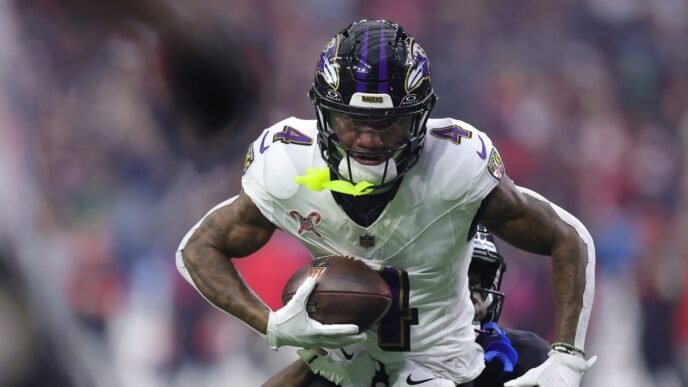Welcome to the online version of From the Politics Desk, an evening newsletter that brings you the NBC News Politics team’s latest reporting and analysis from the White House, Capitol Hill and the campaign trail.
We may be entering the summer of an off-year, but June is still shaping up to be a big election month. Steve Kornacki breaks down what to watch in the New Jersey, Virginia and New York City primaries in the coming weeks. Plus, Scott Wong talks to House Minority Leader Hakeem Jeffries about his “more is more” strategy for taking on President Donald Trump — and whether Democrats’ message is breaking through.
Sign up to receive this newsletter in your inbox every weekday here.
— Adam Wollner
 We want to hear from you!
We want to hear from you!
Have a question for the NBC News Politics Desk about Trump’s “big, beautiful bill,” this month’s elections or anything else happening on the world of politics?
Send your questions to politicsnewsletter@nbcuni.com and we may answer them in a future edition of the newsletter.
The key dynamics shaping a busy month of primaries
By Steve Kornacki
The next three weeks will bring primaries in the three most closely watched races of 2025. Here are the key dynamics to watch:
New Jersey: Both parties will nominate gubernatorial candidates in the Garden State on June 10. Barring a complete shock, this will serve as a coronation for Republican Jack Ciattarelli, who was already leading by wide margins in the polls when President Donald Trump endorsed him several weeks ago.
The Democratic contest isn’t as clear-cut, but there is a favorite: Rep. Mikie Sherrill has separated herself from the six-candidate field in the most recent polling and enjoys strong backing from the state’s still-powerful (though probably not as much as before) county political machines. The combination of Trump’s surprising strength in New Jersey last year and Gov. Phil Murphy’s unexpectedly close re-election in 2021 has Democratic leaders apprehensive about their November prospects. Many concluded that Sherrill, a Navy veteran who flipped a GOP-held district to win her House seat in 2018, would be their most electable option.
Worth keeping an eye on, though, is a pair of mayors. Jersey City’s Steve Fulop is portraying his candidacy as a war against political bossism and has aligned with local anti-establishment candidates. And Newark’s Ras Baraka will try to couple support from Black voters (over 20% of the prim electorate) with appeal to the party’s broader progressive base, especially after his high-profile arrest at an ICE detention facility. But both have lagged in polling and their overlapping appeal to progressives only complicates each other’s path.
Once the matchup is set, the general election will feature a clash of two long-term trends. On the one hand, New Jersey has only elected a governor from the party that controls the White House once in the last nine races — an ominous harbinger for the GOP. But it also hasn’t handed the same party power in Trenton for three straight elections since 1961 — a feat Democrats are trying to pull off this year. Something will have to give.
Virginia: On June 17, Virginia Democrats and Republicans will officially set their slates for the fall. Both gubernatorial nominations are already settled: Lt. Gov. Winsome Earl-Sears for the Republicans and Rep. Abigail Spanberger for the Democrats.
And the general election picture already looks clearer in Virginia than in New Jersey. Polling has consistently shown Spanberger — who, like Sherrill, flipped a Republican seat en route to Congress in 2018 — ahead of Earl-Sears. And in 11 of the last 12 gubernatorial races, Virginians have sided against whichever party controlled the White House at the time.
New York City: And then there’s the mayoral prim in the Big Apple on June 24, the city’s first with a ranked-choice voting system.
Former Gov. Andrew Cuomo is the front-runner on the Democratic side, but the two most recent polls show Assemblyman Zohran Mamdani emerging from the crowded field as his main competition. Mamdani, a democratic socialist, has tapped into support from voters who tend to be younger, college-educated and progressive. He also runs significantly better with white voters than nonwhite voters.
While certainly large, Mamdani’s coalition is not broad enough demographically to win the prim — at least not yet. But his rapid rise presents some interesting potential scenarios. If Mamdani ends up toppling Cuomo, the former governor could still run in the general election anyway, on the ballot line of a party he just created. It’s a move that his father, Mario Cuomo, tried back in 1977, after he fell short in the Democratic mayoral prim.
There’s also the leftist Working Families Party, which also has its own general election ballot line. Its leaders have indicated they have no plans to let Cuomo have that line even if he wins the Democratic prim. More recently, the party formally recommended that voters rank Mamdani as their top choice in the Democratic prim. If Mamdani misses narrowly in the Democratic prim, could he still run this fall as the WFP’s candidate? Would someone else?
On top of all of this, New York City Mayor Eric Adams is still officially running. He’s bypassing the Democratic prim but has ballot lines of his own for the general election. Few think Adams can actually win in November, but his potential to grab a sizable chunk of votes could make a third-party bid more enticing for another candidate.
‘More is more’: Hakeem Jeffries pushes Democrats to flood the zone in opposition to Trump
By Scott Wong
In the chaotic opening weeks of President Donald Trump’s second administration, Democrats debated whether to push back on every norm-shattering executive action, or pick and choose their spots and hope Trump would prove to be his own worst enemy.
That debate has been settled, with Democrats aggressively taking on Trump in the courts, in the streets and on social media.
At the center of that messaging strategy is House Minority Leader Hakeem Jeffries, D-N.Y., who privately has been urging his members to be more visible in their districts and on digital media, and has stepped up his own activity in recent weeks.
Rather than his regular, once-a-week news conference in the Capitol, Jeffries now holds as many as three press briefings with reporters each week in Washington. He is also making weekly appearances on popular podcasts outside the traditional political media circuit, including those hosted by Stephen A. Smith, Tony Kornheiser, Jon Stewart, Katie Couric and Scott Galloway.
“We are in a ‘more is more’ environment. These aren’t ordin times, and they require an extraordin response,” Jeffries said in a phone interview with NBC News on Tuesday, one of roughly two dozen digital media interviews he has participated in since Febru.
After suffering a bruising defeat in the last presidential election and still years out from the next one, Democrats are without a clear national leader. And the party’s base has displayed a hunger for a new and younger generation of voices to take charge.
That has opened the door for Jeffries, 54, to assume an even bigger role in the party, even as he is still coming into national prominence and — less than three years removed from succeeding Nancy Pelosi as House Democrats’ leader — not yet a household name.
The flood-the-zone strategy is a marked change for a politician with a reputation for being cautious and calculated. But if that game plan pays off and Democrats manage to win control of the House in next year’s midterm elections, Jeffries would be the favorite to become speaker — and the party’s most powerful member in Washington.
“He’s meeting the moment,” Rep. Ro Khanna, D-Calif., an influential progressive in the party, told NBC News in an interview. “And that’s why I say he’s, right now, the leader of the Democratic Party.”
Read more from Scott →
 Today’s top stories
Today’s top stories
With friends like these: Days after his White House send-off, Elon Musk slammed the GOP’s massive bill for Trump’s agenda as a “disgusting abomination.” Read more →
Rescissions: The White House sent congressional leaders a request to claw back $9.4 billion in approved spending, codifying DOGE cuts to USAID, NPR and PBS, among other areas. Read more →
-
Clock’s ticking: Trump’s ambitious plan to broker dozens of trade deals with some of the United States’ closest trading partners has begun to show cracks, with his 90-day pause for most country-specific tariffs winding down in just over a month. Read more →
-
Succession: Rep. Jasmine Crockett of Texas officially jumped into the race to be the top Democrat on the House Oversight Committee, setting up a generational battle to succeed the late Rep. Gerry Connolly, D-Va. Virginia Gov. Glenn Youngkin also set the special election to fill the seat previously held by Connolly for Sept. 9.
-
In the courts: Newark Mayor Ras Baraka is suing interim U.S. Attorney for New Jersey Alina Habba, alleging she violated his constitutional rights and defamed him when he was arrested at a federal immigration detention center last month. Read more →
-
Phase two: Democratic attorneys general from California, Massachusetts and New Jersey laid out their plans for the next phase of the legal battle against Trump in an interview with NBC News. Read more →
-
Just kidding: Acting Federal Emergency Management Agency Administrator David Richardson was joking when he said he was not aware of the upcoming hurricane season, the Department of Homeland Security said in a statement. Read more →
- Follow live politics updates →
That’s all From the Politics Desk for now. Today’s newsletter was compiled by Adam Wollner.
If you have feedback — likes or dislikes — email us at politicsnewsletter@nbcuni.com
And if you’re a fan, please share with everyone and anyone. They can sign up here.













